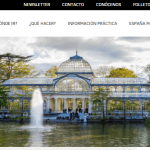SEGITTUR has presented its Guide for Good Practices in Accessibility for Smart Destinations, prepared in collaboration with the DTI Network.
The smart destinations model considers accessibility as one of its five pillars, consisting of 17 requirements and 43 indicators through which both accessibility management in the destination and its implementation are assessed.
The Guide brings together 21 actions carried out in destinations across the DTI Network, as well as in other international destinations, aimed at overcoming the challenges of managing and implementing accessibility in tourist destinations, considering that accessibility is an essential factor of a responsible tourism policy.
The Guide identifies eight challenges for the management and implementation of accessibility in tourism, including: improving public-private cooperation, incorporating accessibility beyond the architectural scope, improving continuity between the rungs on the ladder, enhancing accessibility resources applied at a management level, having truthful, up-to-date and reliable information, improving personalised assistance, increasing training and awareness; and bringing technological solutions closer to users.
Case of best practices
The guide includes good practices from national destinations such as Arona, Costa del Sol, Extremadura, Madrid, Malaga, Palma, Barcelona province, Salamanca, Santa Cruz de Tenerife, Valencia, Villajoyosa, Vitoria-Gasteiz and Zaragoza; international destinations such as Iguazú Falls, Wallonia, Flanders and Lyon; and global initiatives from countries such as France, England, El Salvador and Portugal.
Best practices include inclusive beaches with customised assistance in Arona; the protocol for assisting people with disabilities in emergencies and disasters in El Salvador; accessibility advice offices in Extremadura; the Tourisme & Handicap brand for resources in France; the recognition of accessibility at the tourism excellence awards in England; and the inclusive tourist office in Madrid.
Also worth mention is the deployment of accessibility across the Malaga transport network, municipal training in accessibility in Palma, the programme for raising awareness and promoting inclusion in Portugal, accessible natural routes in the province of Barcelona, the tourist app with inclusive personalisation in Salamanca or the accessibility office in Santa Cruz de Tenerife.
In addition to these are the commitment to accessibility at museum spaces in Villajoyosa, the public mailbox for accessibility incidents in Vitoria-Gasteiz, the accessible resources guide in Valencia, the welcome guide for people with disabilities in Wallonia (Belgium) or adapted guided tours in Zaragoza.





